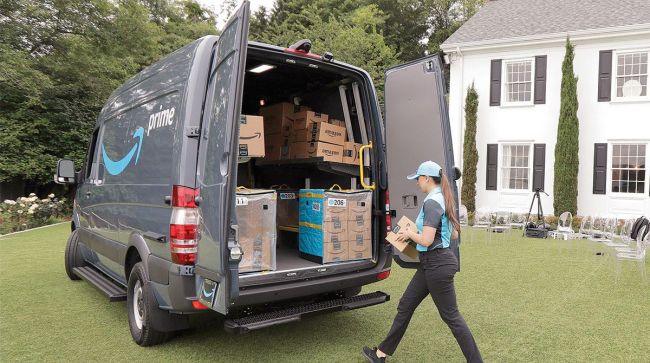Amazon said more than half of all orders placed by Prime subscribers in the 60 largest metropolitan areas during the most recent quarter arrived the same or next day. (Ted S. Warren/Associated Press)
Amazon.com Inc. will double the number of U.S. same-day delivery facilities in the “coming years,” the company announced July 31, an investment executives are counting on to maintain Amazon’s lead in the $1.4 trillion online shopping market.
Speedy delivery remains a major imperative for Amazon, and the company said more than half of all orders placed by Prime subscribers in the 60 largest metropolitan areas during the most recent quarter arrived the same or next day. Amazon also said that it has delivered more than 1.8 billion units to Prime members in the U.S. with same-day or one-day delivery so far this year, up about fourfold from the same period in 2019.
The chest-thumping comes days before Amazon is scheduled to report second-quarter financial results and suggests executives are keen to shore up investor faith in the money-losing e-commerce business. Online sales growth has slowed from its breakneck pace during the pandemic, and Amazon has become increasingly reliant for profit on its cloud-computing business, which also has been slowing.
The Seattle-based giant didn’t disclose how many same-day warehouses it currently has, but doubling the number would probably entail building dozens of new facilities. Amazon currently has millions of products available for same-day delivery in 90 metropolitan areas in the U.S. Same-day facilities are smaller and closer to major population centers than Amazon’s bigger warehouses, which are located near highways on the outskirts of big cities.
“These hybrid facilities allow us to fulfill, sort and deliver all from one site, making the entire process of delivering customer packages even faster,” Amazon’s Worldwide Stores chief Doug Herrington said in the announcement. “Amazon selection varies by city, as we regularly update our product offering based on what we’re seeing as top customer items purchased or based on seasonal demand in the area.”
We’re delivering our largest selection of products at the fastest speeds ever to U.S. Prime members – more than 1.8 billion units reached them the same or next day so far this year.
Thanks to all teams, customers, and delivery partners! 🧡 https://t.co/l7Gb8JtHrB pic.twitter.com/hk2BE5hpRs
— Amazon (@amazon) July 31, 2023
Fast delivery of online orders helped Amazon become the market leader in the U.S., capturing more than one-third of all spending, or about six times more than its closest competitor Walmart Inc., according to estimates by Insider Intelligence. But investors are increasingly concerned about the margin-eating costs of packing orders and ferrying them to customers’ homes. Traditional retailers like Walmart have an advantage because their stores double as pickup locations.
Amazon’s investment in same-day delivery will likely get a mixed reaction from investors, said Neil Saunders, an analyst at Globaldata Plc. Some will be encouraged that Amazon can increase sales, make online shopping more convenient and its operations more efficient. Others will worry about the upfront costs since the facilities are expensive to build and require a lot of automation, prompting concerns about how long it will take the savings to offset the investment, he said.
“Amazon has got some work to do in convincing people this will be beneficial to the bottom line because investors will be a little bit spooked by it,” Saunders said.
Amazon’s focus on delivery speed coincides with a trial in its home state of Washington focused on injuries at its warehouses. State officials have alleged Amazon facilities are hazardous to workers who endure long shifts, mandatory overtime and fast-paced work that puts unsustainable strain on their bodies. The company disputes the allegations and will be making its case in hearings scheduled to run into the fall.
Amazon is scheduled Aug. 3 to report results for the period ending June 30. Analysts are projecting earnings of 35 cents per share on sales of $132 billion.
Amazon ranks No. 19. on the Transport Topics Top 100 list of the largest private carriers in North America.






